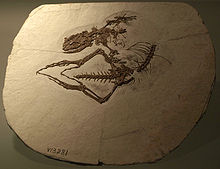Dalinghosaurus
|
Dalinghosaurus Temporal range: Early Cretaceous 146–100 Ma |
|
|---|---|
 |
|
| Dalinghosaurus longidigitus on display at the Paleozoological Museum of China | |
| Scientific classification | |
| Kingdom: | Animalia |
| Phylum: | Chordata |
| Class: | Reptilia |
| Order: | Squamata |
| Genus: | †Dalinghosaurus |
| Species: | †D. longidigitus |
| Binomial name | |
|
Dalinghosaurus longidigitus Ji, 1998 |
|
Dalinghosaurus (often incorrectly spelled "Dalinghesaurus") is an extinct genus of lizards, first described in 1998 by S.A. Ji of the Peking University Department of Geology. The type species is Dalinghosaurus longidigitus.
Although it lived during the Early Cretaceous, A 2005 study found that Dalinghosaurus was related to several modern-day lizards in the family Xenosauridae, the knob-scaled lizards. Its relatives include the modern Chinese crocodile lizard (Shinisaurus) of southern China, the extinct Exostinus of Montana and Wyoming, and the extinct Carusia of Mongolia. It is differentiated from Carusia by having fewer, more conical shaped teeth. Differences in skull and mandible shape separate it from Shinisaurus.
Eleven specimens of Dalinghosaurus are held by the IVPP in Beijing. One fossil skeleton contains the skeletons of ten or more juveniles.
...
Wikipedia
